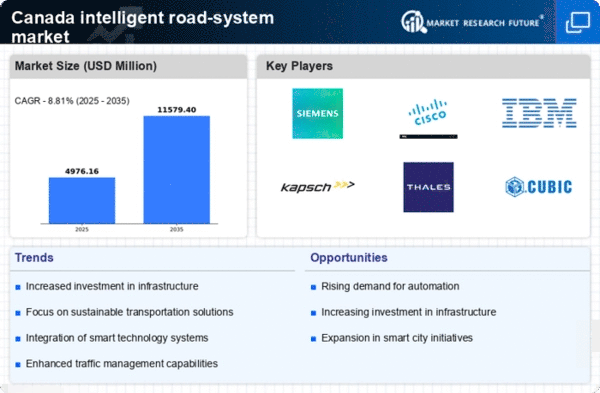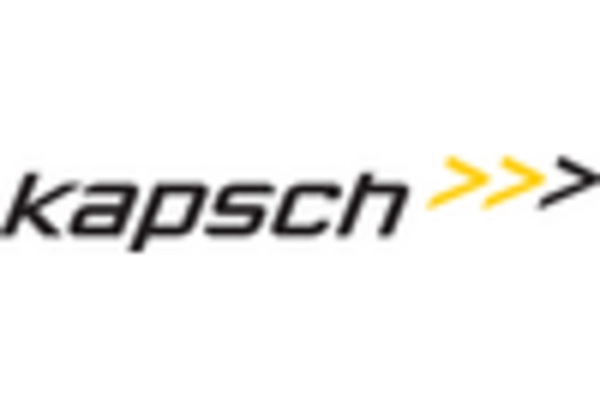Government Initiatives and Funding
The Canadian government actively promotes the development of the intelligent road-system market through various initiatives and funding programs. Investments in smart infrastructure are expected to reach approximately $1.5 billion by 2026, aimed at enhancing road safety and efficiency. These initiatives often focus on integrating advanced technologies such as IoT and AI into existing road systems. The government’s commitment to improving transportation networks is likely to stimulate growth in the intelligent road-system market, as municipalities and provinces seek to leverage these funds for innovative projects. Furthermore, the emphasis on reducing traffic congestion and improving air quality aligns with the objectives of the intelligent road-system market, creating a conducive environment for technological advancements and partnerships within the industry.
Urbanization and Population Growth
Canada's urbanization trend, characterized by increasing population density in metropolitan areas, significantly impacts the intelligent road-system market. As cities expand, the demand for efficient transportation solutions intensifies. By 2030, it is projected that over 80% of Canadians will reside in urban areas, leading to heightened traffic congestion and infrastructure strain. This scenario necessitates the adoption of intelligent road systems to manage traffic flow and enhance safety. The intelligent road-system market is poised to benefit from this urban growth, as municipalities invest in smart traffic management systems and real-time data analytics to address the challenges posed by urbanization. Consequently, the industry is likely to experience robust growth as cities seek innovative solutions to improve mobility and reduce environmental impact.
Technological Advancements in Transportation
Rapid technological advancements are reshaping the landscape of the intelligent road-system market in Canada. Innovations such as vehicle-to-everything (V2X) communication, smart traffic signals, and autonomous vehicle integration are becoming increasingly prevalent. The market for connected vehicles is expected to grow at a CAGR of 25% over the next five years, driving demand for intelligent road systems that can accommodate these technologies. As vehicles become more connected, the need for infrastructure that supports real-time communication and data exchange becomes critical. This evolution presents opportunities for the intelligent road-system market to develop solutions that enhance safety, reduce travel times, and improve overall traffic management. The integration of these technologies is likely to redefine transportation systems across Canada, fostering a more efficient and sustainable future.
Public Awareness and Demand for Smart Solutions
There is a rising public awareness regarding the benefits of smart transportation solutions, which is driving demand within the intelligent road-system market. Canadians are increasingly recognizing the advantages of intelligent road systems, such as improved safety, reduced congestion, and enhanced travel experiences. Surveys indicate that over 70% of Canadians support the implementation of smart technologies in transportation. This growing demand encourages municipalities and private sector stakeholders to invest in intelligent road systems that cater to public expectations. As citizens advocate for safer and more efficient transportation options, the intelligent road-system market is likely to expand, fostering innovation and collaboration among industry players. The alignment of public sentiment with technological advancements creates a favorable environment for the growth of the intelligent road-system market.
Environmental Regulations and Sustainability Goals
The push for sustainability and adherence to environmental regulations are pivotal drivers for the intelligent road-system market in Canada. With the government aiming to reduce greenhouse gas emissions by 30% by 2030, there is a growing emphasis on developing smart transportation solutions that minimize environmental impact. Intelligent road systems can facilitate eco-friendly practices, such as optimizing traffic flow to reduce idle times and emissions. The market is likely to see increased investment in technologies that promote sustainable transportation, including electric vehicle charging infrastructure and smart public transit systems. As cities strive to meet their sustainability goals, the intelligent road-system market is expected to play a crucial role in shaping a greener transportation landscape, aligning with national and provincial environmental objectives.
















